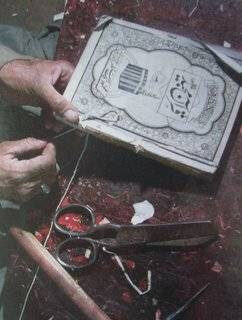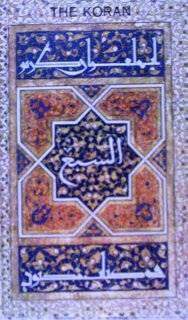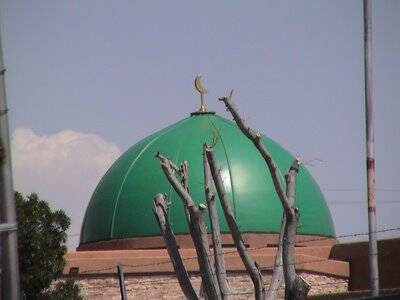Be aware that the various spellings used in this article: Qorr&#a2;n, Qurān, Qur”&#a2;n, Qur’an, Kur’an and Koran are mere variants in referring to the holy book of Islam.
Is the fact that Muhammad wrote of Jesus proof that he was divinely inspired? After all, so the reasoning goes Muhammad lived circa 600 years after Christ and he could not have read the New Testament because it had not yet been translated into Arabic.
It seems that Muhammad had no need of reading the New Testament, all he had to do was to hear what it taught from the many peoples who traveled through his land. We know for a fact that this is the case because in the Qur’an we find statements not just about Jesus but many statements that comment on what Christians believe and how Muslims are to answer to Christian claims. Muhammad not only writes about Jesus (in a manner that contradicts the New Testament) but he was aware of Christian doctrine (though he did does not represent it accurately). Some of the verses in the Qur’an which mention Christianity are, Surah 2:111, 2:113, 2:120, 2:135, 5:14, 5:17-18, 5:82, 22:17. Surah 22:40 mentions churches.

On the Qur’an: Henry Halley explains that apocryphal New Testament books are,
“legendary and spurious Gospels, Acts of the Apostles and Epistles, which began to appear in the 2nd Century. They were mostly forgeries, and were so recognized from the first_It is said that Mohammed got his ideas of Christianity largely from these books.”1
For example, Surah 5:110 makes reference to the apocryphal or Gnostic book titled The Infancy Gospel of Thomas 2:3-5. The writer of this gospel does not even claim to be the Apostle Thomas but identifies himself as a philosopher. This gospel is a shameful work that contradicts the New Testament and has the child Jesus using His divine power, His miracles, in a capricious and malicious manner.
Encyclopedia Judaica 2:119-121, “When Muhammad began to fill his suras with stories of the prophets, Abraham received a large share, mainly on the bases of material drawn from talmudic legends. Abraham, by his own reasoning, recognized that his Creator was God and not a shining star, the moon, or the sun_There is little doubt that, in one form or another, he heard the story of Abraham as the founder of the Holy Temple of Jerusalem, as told in the Book of Jubilees (22:23-4)_The koranic story of Abraham_contains many rabbinical legends_The enormous expansion of these stories in Islamic religious, historical, and narrative literature has been researched by four generations of Jewish scholars_These researchers show that the legends had been spread in Arabia in very early times.”
“Any one can see how little its claim ‘to confirm and perfect the teaching of the former prophets’ is worth. Mohammed picked up all his knowledge of this kind by hearsay, and he makes a brave show with such borrowed trappings-largely consisting of legends from the Haggada and the Apocrypha.”2
“As early as Muhammad’s initial years in Mecca and Medina, he undoubtedly established intimate contacts with members of the Jewish community long settled in the Arabian peninsula. The Koran_amply testifies to his debt to Jewish traditions. Not only did he appropriate Abraham and Moses (as well as Jesus) as prophets_he also freely utilized Jewish concepts and literary motifs throughout Muslim scripture. Rabbinic Judaism thus left a fundamental imprint on Islam from its inception.”3
The Concise Encyclopaedia of Islam, “Many stories in the Koran resemble those of the Jewish midrash, popular and didactic versions of Biblical events which act as commentaries on the Scripture_According to tradition, a definitive editing of the Koran was carried out in the Caliphate of ‘Uthman in order to avoid complications caused by variant texts_The Koran was collected from the chance surfaces on which it had been inscribed ‘from pieces of papyrus, flat stones, palm leaves, shoulder blades and ribs of animals, pieces of leather, wooden boards, and hearts of men.’”4
Hearts of men refers to certain memorized sayings. However, some of those men who had memorized sayings of Muhammad died in battle before these were recorded. It is also admitted that sometimes animals would eat the leaves and other items on which the Surahs had been recorded. Besides this, when it became apparent that there were various versions of the Qur’an that conflicted with each other, Caliph ‘Uthman attempted to concoct an authorized text. He also set out to burn all the manuscripts that disagree with the one that became authorized.
Encyclopedia Britannica 10:58:3a, “a notoriously bloody battle at ‘Aqraba’ in eastern Nasd (May 633), afterward known as the Garden of Death. The encounter cost the Muslims the lives of many ansar (disciples of the prophet) who were invaluable for their knowledge of the Qur’an, which had been revealed to the prophet, recited to his disciples, and memorized by them but not yet written down.”
Encyclopedia Britannica 12:219:1b-2a, “caliph ‘Uthman promulgated an official version of the Qur’an, which had existed in various versions.”
The Encyclopedia of Islam, “The task of preparing the written scripture included some revision and alteration of earlier revelations_The Kur’an itself acknowledges that changes were made in the revelation: ‘For whatever aya We abrogate or cause [you, i.e. Muhammad] to forget, We bring [another that is] better or like it’ (II, 106), and ‘When We substitute one aya for another-they say: ‘You [Muhammad] are a mere forger” (XVI, 101).
A similar verse, XXII, 52, gives another explanation for changes in the revelation: ‘We have never sent any messenger or prophet before you [Muhammad], but Satan cast [something] into his thoughts when he was yearning [for a message from God]. But God abrogates what Satan casts in, and then God adjusts his ayat.’
These verses seem to be responses to complaints or accusations about changes in the revelation. The Kur’an gives three explanations: that Muhammad sometimes forgot parts, that Satan inserted something into the revelation, and that God simply replaced some parts with other as good or better. The term aya in these passages came to be interpreted as ‘verse,’ but the Kur’an gives no indication as to the length of these units of revelation that were withdrawn and replaced by others.”5The Encyclopedia of Islam, “In addition to the usual difficulties of evaluating Muslim sources that were regulated by the science of hadith, the task of reconstructing the history of the Kur’an is further complicated by the fact that the classical literature records thousands of textual variants, which, however, are not found in any extant manuscripts known to Western scholars. Several valuable works on the history of the Kur’an were written during the 4th/10th century_but later Muslim scholars, with just a few exceptions have shown little interest in the problem of reconstructing the history of the canon.”6
Of course, as we will show below, according to the Hadith itself if there are no variations in the manuscripts known to Western scholars it is because those manuscripts were burnt.

The Hadith on Confusion, Changes and Collections:
Here we will quote from Sahih Bukhari,
“a collection of sayings and deeds of Prophet Muhammad_Each report in his collection was checked for compatibility with the Qur’an, and the veracity of the chain of reporters had to be painstakingly established. Bukhari’s collection is recognized by the overwhelming majority of the Muslim world to be one of the most authentic collections_is considered second to none.”7
It is calculated that out of a possible 600,000 hadiths Bukhari considered 2,762 to be authentic (aka strong).
Volume 1, Book 3, #112, “In the year of the Conquest of Mecca, the tribe of Khuza’a killed a man from the tribe of Bani Laith in revenge for a killed person, belonging to them. They informed the Prophet about it. So he rode his Rahila (she-camel for riding) and addressed the people saying, ‘Allah held back the killing from Mecca. (The sub-narrator is in doubt whether the Prophet said ‘elephant or killing,’ as the Arabic words standing for these words have great similarity in shape).”
Vol. 1, Book 4, #179, “I asked ‘Uthman bin ‘Affan about a person who engaged in intercourse but did no discharge. ‘Uthman replied, ‘He should perform ablution like the one for an ordinary prayer but he must wash his penis.’ ‘Uthman added, ‘I heard it from Allah’s Apostle.’ I asked ‘Ali Az-Zubair, Talha and Ubai bin Ka’b about it and they, too, gave the same reply. (This order was canceled later on and taking a bath became necessary for such cases).”
Vol. 1, Book 4, #180, “Allah’s Apostle sent for a Ansari man who came with water dropping from his head. The Prophet said, ‘Perhaps we have forced you to hurry up, haven’t we?’ The Ansari replied, ‘Yes.’ Allah’s Apostle further said, ‘If you are forced to hurry up (during intercourse) or you do not discharge then ablution is due on you’ (This order was canceled later on, i.e. one has to take a bath).”
Vol. 4, Book 52, #57, “We used to recite, ‘Inform our people that we have met our Lord, He is pleased with us and He has made us pleased’ Later on this Quranic Verse was canceled.”
Vol. 4, Book 52, #62, “the Quran was compiled from various written manuscripts.”
Vol. 4, Book 52, #69, “There was reveled about those who were killed at Bir-Mauna a Quranic Verse we used to recite, but it was canceled later on. The Verse was: ‘Inform our people that we have met our Lord. He is pleased with us and He has made us pleased.’”
Vol. 4, Book 52, #299, “Narrated Qatada: Anas told us that they (i.e. Muslims) used to recite a Quranic Verse concerning those martyrs which was:-‘O Allah! Let our people be informed on our behalf that we have met our Lord Who has got pleased with us and made us pleased.’ Then the Verse was canceled.”
Vol. 4, Book 56, #709, “they wrote the manuscripts of the Holy Qur’an in the form of book in several copies. ‘Uthman said to the three Quraishi persons. ‘If you differ with Zaid bin Thabit on any point of the Quran, then write it in the language of Quraish, as the Quran was revealed in their language.’ So they acted accordingly. (Said bin Thabit was an Ansari and not from Quraish).”
Vol. 6, Book 61, #507, “The Caliph ‘Uthman ordered Zaid bin Thabit, Said bin Al-As, ‘Abdullah bin Az-Zubair and ‘Abdur-Rahman bin Al-Harith bin Hisham to write the Qur’an in the form of a book (Mushafs) and said to them. ‘In case you disagree with Zaid bin Thabit (Al-Ansari) regarding any dialectic Arabic utterance of the Quran, then write it in the dialect of Quraish, for the Quran was revealed in this dialect.’ So they did it.”
Vol. 6, Book 61, #509, “Umar has come to me and said: ‘Casualties were heavy among the Qurra’ of the! Qur’an (i.e. those who knew the Quran by heart) on the day of the Battle of Yalmama, and I am afraid that more heavy casualties may take place among the Qurra’ on other battlefields, whereby a large part of the Qur’an may be lost. Therefore I suggest, you (Abu Bakr) order that the Qur’an be collected‘_So you should search for (the fragmentary scripts of) the Qur’an and collect it in one book_So I started looking for the Qur’an and collecting it from (what was written on) palmed stalks, thin white stones and also from the men who knew it by heart.”
Vol. 6, Book 61, #510, “Hudhaifa was afraid of their (the people of Sham and Iraq) differences in the recitation of the Qur’an, so he said to ‘Uthman, ‘O chief of the Believers! Save this nation before they differ about the Book (Qur’an) as Jews and the Christians did before.’ So ‘Uthman sent a message to Hafsa saying, ‘Send us the manuscripts of the Qur’an so that we may compile the Qur’anic materials_rewrite the manuscripts in perfect copies.’ ‘Uthman said to the three Quraishi men, ‘In case you disagree_’Uthman sent to every Muslim province one copy of what they had copied, and ordered that all the other Qur’anic materials, whether written in fragmentary manuscripts or whole copies, be burnt.”
Vol. 6, Book 61, #511, “you should search for (the Qur’an and collect) it.”

In my essay Misconceptions in Reason and History we show that Islam claims that the Bible could not be accurately handed down to us by citing reasons that are likewise applicable, as we have just seen, to Islam’s own Qur’an and Hadith.
Muhammad’s first revelation came about 610 AD. For 40 years, until ‘Uthman’s collection and destruction of fragments, the Qur’an was fragmentary and passed on orally. From the time of the first surah to the earliest known copy 163 years passed.
According to Al Bukhari the Qur’an was first put together a year after Muhammad died by Zaid ibn Thabit who was directed to do so by Khalifa Abu Bakr, who stated:
“Truly the slaughter on the day of Al Yamamah was severe among the Reciters of the Qur’an and indeed I fear that there has been severe slaughter in the battlefields among the Reciters, therefore much of the Bookis going away (being lost), and I consider that you should give orders for the collecting of the Qur’an_
Accordingly I sought out the Qur’an. I gathered it together from leafless palm branches, and thin white stones, and men’s breasts_And the sheets were with Abu Bakr until God caused him to die, then with Omar during his life, then with Hafsa, Omar’s daughter.”8
However, this text also did not survive the destruction of the primary source material. Since after Hafsa’s death Marwan, the Governor of Medina, had it collected and disposed of.
Some of the people who collected the surahs before ‘Uthman codified a text and burned the variant texts are the following:Abdullah Ibn Mas’ud, the personal servant of Muhammad made a collection of some seventy surahs.Ubai b. Ka’b was one of the Ansars and served as Muhammad’s secretary, his text included two surahs and additions to surah 10:24 not found in ‘Uthman’s text.Ali Ibn Abi Talib was Muhammad’s son-in-law.Ibn Abbas and Abu Musa’s texts included two extra surahs and additional verses.
These men’s texts were destroyed at ‘Uthman’s (or Othman) command. Muslims generally claim that the variations between the various collections of surahs were very minor and involved only questions of pronunciations. Yet, the Hadith informs us that the variations were of a serious enough nature that accusations of unbelief flew. This Hadith also demonstrates ‘Uthman’s deceptive manipulations whereby he acquired text with a promise to return them only to end up burning them.
“A committee headed by Zaid ibn Thabit, a Medinese who had been Muhammad’s secretary, gathered all the fragments of text and memory extant, collecting pieces of parchment and bone on which verses had been recorded, and produced a text which the Caliph, Uthman, proclaimed official. All others were ordered destroyed, This work of Zaid and his associates remains the only and unchallenged version of the Koran, never to be revised, exempt by its divine origin from the tinkering to which the Bible has been subjected.”9
“When we come to look at the external evidence there is considerable justification for the belief that the Qurān was subject to alteration in its initial stages; indeed that large number of variants, not always trifling in significance, confirms the assumption. First of all, there is the notorious verse (53:19 f.) ‘Have you considered al-Lāt and al-‘Uzzā and Manāt the third other?’ which was once followed by the words ‘Verily they are the exalted maidens and their intercession is to be hoped for.’The earliest authority on the life of Muhammad asserts that these words were uttered by Muhammad at the instigation of Satan, and caused enormous dismay among the heathen Meccans and corresponding dismay among his own followers.
What gave special significance to these words was the fact that they were those of the chant of the Quraysh as they processed round the Ka’ba. The Qurān has made a slight alternation and a significant omission: instead of saying ‘By al-Lāt’, etc., it reads, ‘Have you considered al-Lāt’, etc., and the sentence about the exalted maidens is dropped altogether.”10
“Muslim reverence for the Qur”&#a2;n culminated, about two hundred years after the Hijra, in the dogma that it is the eternal and uncreated Word of God.”11
“The orthodox believe that the Qorr&#a2;n is uncreated and eternal. This question, however, was at one time the subject of a heated controversy. The Abbaside Caliph el-Mamun made an edict declaring the Qorr&#a2;n to be created. This edict was confirmed by his successors, Mu’tasim and WW&#a2;thik, who whipped, imprisoned, and put to death those who held otherwise. Mutawakhil (A.D. 847-861) revoked the edict, and put an end to the persecutions.”12
